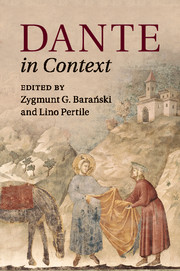Book contents
- Frontmatter
- Dedication
- Contents
- List of illustrations
- List of maps
- Notes on contributors
- Chronology
- Abbreviations and note on translations
- Introduction
- Part I Politics and society
- Part II Intellectual traditions
- 9 Philosophy and theology
- 10 Moral philosophy
- 11 Natural philosophy
- 12 Medicine
- 13 Islamic and Jewish influences
- 14 Cosmology, geography, and cartography
- Part III Linguistic and literary cultures
- Part IV Visual and performative culture
- Part V Dante: life, works, and reception
- Further reading
- Index
9 - Philosophy and theology
from Part II - Intellectual traditions
Published online by Cambridge University Press: 05 October 2015
- Frontmatter
- Dedication
- Contents
- List of illustrations
- List of maps
- Notes on contributors
- Chronology
- Abbreviations and note on translations
- Introduction
- Part I Politics and society
- Part II Intellectual traditions
- 9 Philosophy and theology
- 10 Moral philosophy
- 11 Natural philosophy
- 12 Medicine
- 13 Islamic and Jewish influences
- 14 Cosmology, geography, and cartography
- Part III Linguistic and literary cultures
- Part IV Visual and performative culture
- Part V Dante: life, works, and reception
- Further reading
- Index
Summary
Philosophia and theologia
To understand the role of theology and philosophy in Dante, it is important to remember that, in the Middle Ages, the symbiosis between knowledge and religious faith was universally accepted. The Bible constituted the culture's key and determining authoritative text, which in practice meant constant reference to the Christian idea of the divine based on scriptural revelation, namely the Trinity, creation from nothing, the Incarnation, and the resurrection of the dead.
In order to grasp the key features of this synthesis, it is useful to stress four elements: one terminological, the other three historical. Let us begin by examining the meanings and values of the two terms that circumscribe this chapter: philosophy and theology. During the long Latin Middle Ages, from Augustine (354–430) and Boethius (c.475–c.526) until the time of Bonaventure (1221–74) and Thomas Aquinas (1225–74), the terms philosophia and theologia were far from semantically stable. A rapid glance at the late-antique and high-medieval tradition brings to the fore the terms' distinct principal meanings – meanings that persist up to Dante's time.
Philosophia covered a wider semantic area than theologia: ‘it embraces all knowledge, all education, even rhetoric and poetry’. In general terms, however, it is possible to distinguish two fields, a general and a particular one. In its general meaning, philosophia refers to wisdom (sapientia), namely the highest and most fundamental form of knowledge, as well as the perfect way of life for a rational entity such as a human being. This did not mean simply a notion of wisdom as a superior organizing and hierarchizing activity, which pagan thinkers such as Aristotle had already theorized, but also a proper way of living based on Christ's teachings and Christian values. When such a meaning of wisdom was associated with religious monastic life, for instance, ‘philosophy’ could become synonymous with ‘monastic rule’. The ethical dimension of such a perspective is both implicit and essential: in negative terms, it contributes to defining that which is not useful for achieving salvation. Consequently, ‘true philosophy’ cannot be considered in its essence without also thinking about what stands against it, what prevents humanity from receiving the gift of divine grace. This is not merely an error of knowledge, but an actual sin, a ‘heresy’.
- Type
- Chapter
- Information
- Dante in Context , pp. 137 - 158Publisher: Cambridge University PressPrint publication year: 2015
- 1
- Cited by

